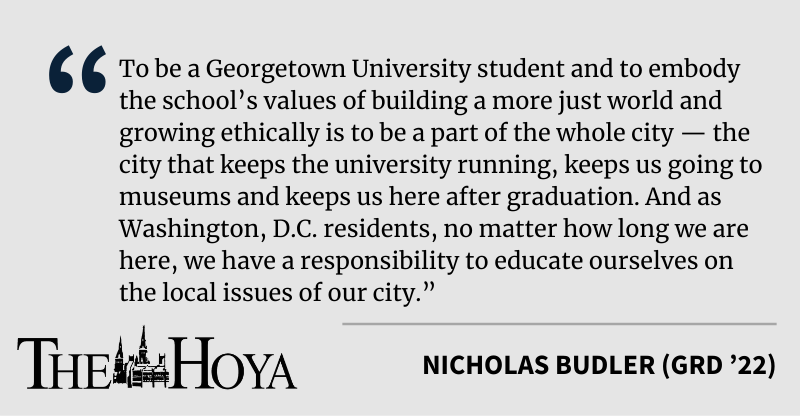To the delight of political junkies and the many politically inclined university students in Washington, D.C., there is an unprecedented influx of never-ending political news emerging from Capitol Hill, a stream of information unlike anything our country’s capital has seen before.
From Trump’s rise to political power in 2016 to a pandemic that stunned the world, the last four years have provided mass amounts of news from just a few square blocks of downtown D.C. The world heard about the city’s lockdown, a security perimeter, and mass protests throughout the summer. People across the world also watched as D.C. bore witness to an insurrection, an impeachment and an inauguration — all in the first two months of 2021.
Despite this flood of national news, there are other important, overlooked stories from around the District that pertain to the local community. Georgetown University students should make an effort to learn about these stories and the people they impact.
Throughout the last four years, away from the attention on the White House and the president’s Twitter account, there have been significant pushes made for local issues, including D.C. statehood, that have long lived in the shadows of the federal government.
When students are just in D.C. for a few years, D.C. statehood may not seem relevant — especially while learning remotely or living in the ‘Georgetown bubble.’ But across the city, divides exist in wealth distribution, vaccine distribution, child poverty, and food deserts. Disparities persist in educational achievement, public school funding, and COVID-19 deaths across all eight wards. The COVID-19 pandemic has worsened many of these divides. These issues, which inadvertently affect all who live in D.C., are often neglected by national media and university syllabi alike.
Thankfully, there is a concerted effort to address local challenges undertaken by local media outlets like Washingtonian and DCist, nonprofits like Shepherd’s Table and Horton’s Kids and Georgetown organizations like the Center for Social Justice Research, Teaching & Service and the Pivot Program, which have been operating tirelessly during the pandemic. Their consistency in bringing news of the local community and opportunities to help is invaluable as they keep alive the idea there is a city here beyond the Hill — one that we all benefit from.
With the Georgetown community mostly limited to virtual spaces, Hoyas are challenged with educating themselves on issues in the wider D.C. community. Social media and local news outlets are good places for students to start. From local council members who care about cyclists’ rights on Twitter to the outspoken Capitol Hill Books owners to charity events promoted by ex-Washington Nationals pitcher Sean Doolitte — goodbye, for now — to the issues addressed throughout an impressive radio career by Koji Nnamdi, people around the District are talking, if students are willing to listen.
In addition, there’s a host of new virtual events at local libraries, restaurants, museums and community centers focused on the local community. But there’s also a whole city to see in real life: neighborhoods to walk, sidewalk sales at bookstores, locally owned restaurants with safe outdoor dining — places Georgetown students can hide from the news and the never-ending stream of who said what on Capitol Hill, places that will help students better understand the importance of local issues. Meeting the people and visiting the places of D.C. are necessary experiences outside the classroom.
So, while there will always be a steady stream of new interns on the Hill, protesters from around the country who leave their garbage on the Mall and wonderful photos of President Biden’s dog, Champ, there will always be another D.C. — one that has been here long before us and will remain here long after graduation and coexists alongside the political arena. And Georgetown students are lucky to be a part of it and to have access to the people who have made it vibrant, historical and exciting.
To be a Georgetown student and to embody the school’s values of building a more just world and growing ethically is to be a part of the whole city — the city that keeps the university running, keeps us going to museums and keeps us here after graduation. And as D.C. residents, no matter how long we are here, we have a responsibility to educate ourselves on the local issues of our city.
Nicholas Budler is a first-year in the Master in Communication, Culture & Technology program.









